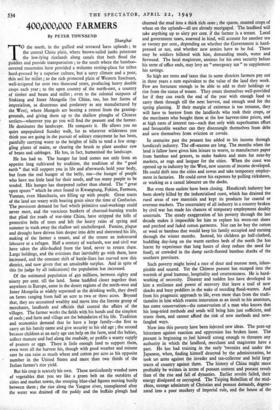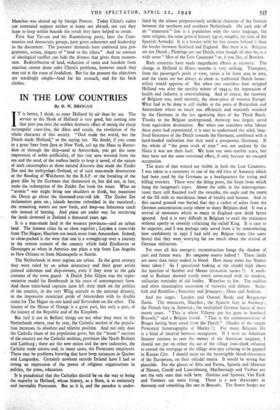400,000,000 FARMERS
By PETER TOWNSEND
Shanghai T0 the north, in the gullied and terraced loess uplands ; to the central China plain, where brown-sailed junks penetrate the low-lying ricelands along canals that both flood the paddies and provide transportation ; to the south where the bamboo-
covered mountains have provided a welcome resting-place for tribes hard-pressed by a superior culture, but a sorry climate and a poor, thin soil for millet ; to the rich protected plain of Western Szechuan, well-irrigated for over two thousand years, producing heavy double crops each year ; to the open country of the north-east, a country of timber and beans and millet ; even to the colonial outposts of Sinkiang and Inner Mongolia (for China, too, has her forms of imperialism, as disastrous and predatory as any manufactured by the West), where Mongols are beating a retreat from the grazing- grounds, and giving them up to the shallow ploughs of Chinese settlers—wherever you go you will find the peasant and the farmer.
He dominates the landscape. He conquers it. He allows you no quiet unpopulated Sunday walk, for to whatever wilderness you think you are going in the pursuit of solitary enjoyment he has been, painfully carrying water to the heights of hills to tend a few strag- gling plants of maize, or clearing the brush to plant another row of beans and cabbages. He has, in fact, humanised the landscape.
He has had- to. The hunger for land comes not only from an appetite long cultivated by tradition, the tradition of the " good earth" that will support you in life and afterwards hold your body, but from the real hunger of the belly, too—the hunger of people who have too little land for their needs, and' too many people to be tended. His hunger has sharpened rather than abated. The " great open spaces " which he once found in Kwangtung, Fukien, Formosa, Yunnan, even Manchuria, are filling up with people. Great tracts of the land are weary with bearing grain since the time of Confucius. The persistent demand for fuel which primitive coal-workings could never meet, and the voracious bunkers of charcoal-burning trucks that plied the roads of war-time China, have stripped the hills of protective belts of trees and left the heavy rains of spring and summer to wash away the shallow soil unchallenged. Famine, plague and drought have driven him deeper into debt and shortened his life, making of the farmer a tenant, and of the tenant an indentured labourer or a refugee. Half a century of warlords, war and civil war have taken the able-bodied from the land, never to return them. Large holdings, and the evictions that inevitably go with them, have increased, and the constant shift of battle-lines has starved now this district, and now given that an unsaleable surplus. And in spite of this (to judge by all indications) the population has increased.
Of the estimated population of 45o millions, between eighty and ninety per cent. till the land. Some huddled closer together than anywhere in Europe, some in the desert regions of the north-west and Inner Mongolia as widely separated as the drinking wells, they dwell on farms ranging from half an acre to two or three acres. Beyond that, they are accounted wealthy and move into the literate group of merchants, landlords and officials that control the affairs of the villages. The farmer works the fields with his hands and the simplest of tools ; and farm and village are the bdundaries of his life. Tradition and economics demand that he have a large family—the first to carry on his family name and give security to his old age ; the second because children at an early age can help on the farm, tend the babies, collect manure and fuel along the roadside, or peddle a scanty supply of peanuts or eggs. There is little enough land to support them, even were all the harvest his, though with good weather and minute care he can raise as much wheat and cotton per acre as his opposite number in the United States and more than two thirds of the Italian farmer's rice yield.
But his crop is scarcely his own. Those meticulously weeded rows of vegetables that you see like a green belt on the outskirts of cities and market towns, the stooping blue-clad figures moving busily between them ; the rice along the Yangtse river, transplanted after the water was drained off the paddy and the buffalo plough had churned the mud into a thick rich ooze ; the sparse, stunted crops of wheat on the uplands—all are already mortgaged. The landlord will take anything up to sixty per cent. if the farmer is a tenant. Local and government taxes, assessed in kind, will account for another ten or twenty per cent., depending on whether the Government is hard- pressed or not, and whether new armies have to be fed. There may be soldiers billeted with him, demanding meals, water and firewood. The local magistrate, anxious for his own security before his term of office ends, may levy an "emergency tax" to supplement his savings.
So high are rents and taxes that in some districts farmers pay out in three years a sum equivalent to the value of the land they work. Few are fortunate enough to be able to add to their holdings or rise from the status of tenant. They count themselves well-provided for if they can reach the end of the year with enough food to carry them through till the next harvest, and enough seed for the spring planting. If their margin of existence is too tenuous, they will have to borrow from the landlords who took their crops, or the merchants who bought them at the low harvest-time prices, and at high rates of interest too—such that only with superhuman effort and favourable weather can they disentangle themselves from debt and save themselves from eviction or corvie.
In centuries past the peasant has added to his income through handicraft industry. The off-seasons are long. The months when the land is fallow have given him leisure to weave, to manufacture paper from bamboo and grasses, to make baskets and mats for near-by markets, or rugs and lacquer for the cities. When the coast was opened up to industry by the West, new sources of income developed. He could drift into the cities and towns and take temporary employ- ment in factories. He could cover his expenses by pulling rickshaws, or working as a casual labourer on the docks.
But even these outlets have been closing. Handicraft industry has been slowly killed by the industrialised coast, which has drained the rural areas of raw materials and kept its products for coastal or overseas markets. The uncertainty of all industry in a country broken by civil war has made his chances of temporary employment doubly uncertain. The steady exaggeration of his poverty through the last decade makes it impossible for him to replace his worn-out shoes and patched and faded cotton garments. Nor can he buy the cotton or wool or bamboo that would keep his family occupied and earning through the winter months. Instead, his children go half-clothed, huddling day-long on the warm earthen beds of the north (he has learnt by experience that long hours of sleep reduce the need for food), or crowded in the damp earth-floored bamboo shacks of the southern provinces.
Such poverty might breed a race of dour and morose men, inhos- pitable and soured. Yet the Chinese peasant has escaped into the warmth of good humour, hospitality and courteousness. He is hard- working of necessity. Disaster and sudden loss have developed in him a resilience and power of recovery that leave a trail of new shacks and busy peddlers in the wake of receding flood-waters. And from his pragmatic approach to life, even more than from the tradi- tionalist in him which resents innovation as an insult to his ancestors, has come conservatism—the conservatism of a man who knows that his long-tried methods and seeds will bring him just sufficient, and trusts them, and cannot afford the risk of new methods and new- fangled ways.
Now into this poverty have been injected new ideas. The pent-up bitterness against exaction and oppression has broken loose. The peasant is beginning to feel himself strong enough to threaten any authority in which the landlord, merchant and magistrate have a part. He has had training in the early 'twenties and under the Japanese, when, finding himself deserted by the administration, he took un arms against the invader and tax-collector and held large tracts of country against them. The history of China might more profitably be written in terms of peasant content and peasant revolt than of the rise and fall of dynasties. Earlier revolts failed, their energy dissipated or corrupted. The Taiping Rebellion of the mid- aoos, strange admixture of Christian and peasant demands, degene- rated into a poor mockery of imperial rule, and the house of the
Manchus was shored up by foreign Powers. Today China's rulers can command support neither at home nor abroad, nor can they hope to keep within bounds the revolt they have helped to create.
First Sun Yat-sen and his Kuomintang party, later the Com- munists and democratic groups, have given coherence and leadership to the discontent. The paasants' demands have coalesced into pro- grammes, action, slogans of " land to the tillers." And no amount of ideological conflict can hide_ the distress that gives them momen- tum. Redistribution of land, reduction of rents and freedom from exaction cannot alone, solve China's problems, however much they may cut at the roots of feudalism. But-for the peasant the objectives are startlingly simple—food for his stomach, and for his back clothes.



































 Previous page
Previous page